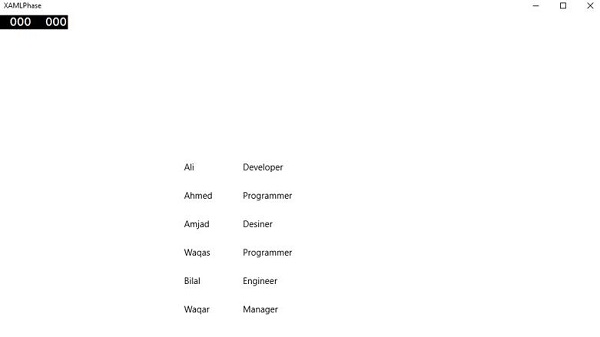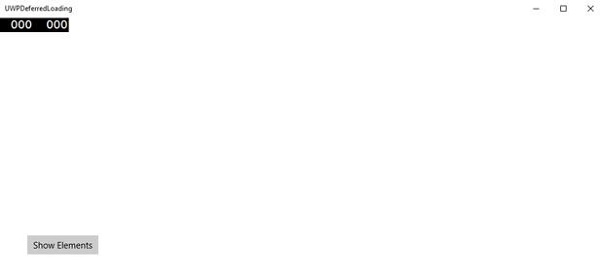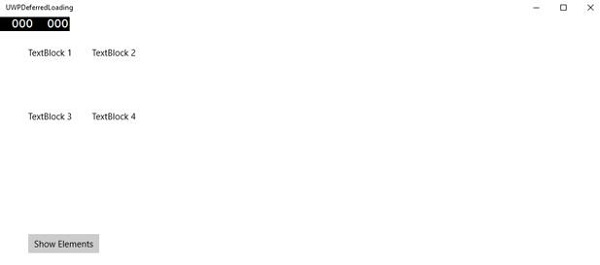Windows 10 开发人员 – XAML 性能
Windows 10 开发人员 – XAML 性能
应用程序的性能(例如您的应用程序在启动时出现的速度或导航以显示下一个内容等)非常重要。
应用程序的性能会受到很多因素的影响,包括 XAML 呈现引擎解析应用程序中所有 XAML 代码的能力。XAML 是用于创建 UI 的非常强大的工具,但通过使用现在可在 Windows 10 应用程序中使用的新技术,它可以变得更加健壮。
例如,在您的应用程序中,您希望在加载页面时显示某些内容,稍后再不需要它。也有可能在启动时您不需要加载所有 UI 元素。
在 Windows 10 应用程序中,XAML 中添加了一些新功能,从而提高了 XAML 性能。
任何通用 Windows 应用程序的性能都可以通过以下技术提高;
- 渐进式渲染
- 延迟加载
渐进式渲染
在 Windows 10 中,XAML 中引入了两个非常酷的新功能。他们是 –
x:绑定
它是 XAML 中引入的一种用于绑定的新语法,其工作方式几乎与Binding语法相同。x:Bind有两个主要区别;它提供编译时语法验证和更好的性能。
X:相位
它提供了在数据模板中优先呈现 XAML 控件的能力。每个 UI 元素可能只指定一个阶段。如果是这样,这将适用于元素上的所有绑定。如果未指定阶段,则假定为阶段 0。
在通用 Windows 平台 (UWP) 应用程序中,这两个新功能提供了性能改进。它还可用于迁移到 Windows 10 的现有 Windows 8.x 应用程序。
下面给出了一个示例,其中使用x:Bind关键字将员工对象与GridView绑定。
<Page
x:Class = "XAMLPhase.MainPage"
xmlns = "http://schemas.microsoft.com/winfx/2006/xaml/presentation"
xmlns:x = "http://schemas.microsoft.com/winfx/2006/xaml"
xmlns:local = "using:XAMLPhase"
xmlns:d = "http://schemas.microsoft.com/expression/blend/2008"
xmlns:mc = "http://schemas.openxmlformats.org/markup-compatibility/2006"
mc:Ignorable = "d">
<Grid Background = "{ThemeResource ApplicationPageBackgroundThemeBrush}">
<GridView Name = "Presidents" ItemsSource = "{Binding}" Height = "300"
Width = "400" Margin = "50">
<GridView.ItemTemplate>
<DataTemplate x:DataType = "local:Employee">
<StackPanel Orientation = "Horizontal" Margin = "2">
<TextBlock Text = "{x:Bind Name}" Width = "95" Margin = "2" />
<TextBlock Text = "{x:Bind Title}" Width = "95" Margin = "2"
x:Phase = "1"/>
</StackPanel>
</DataTemplate>
</GridView.ItemTemplate>
</GridView>
</Grid>
</Page>
在上面的 XAML 代码中,x:Phase = “1”是用 Title 定义的。因此,在第一阶段,将呈现Name,然后将呈现Title。
下面给出的是C# 中的Employee 类实现。
using System.Collections.ObjectModel;
using System.ComponentModel;
using System.Runtime.CompilerServices;
using Windows.UI.Xaml.Controls;
// The Blank Page item template is documented at
http://go.microsoft.com/fwlink/?LinkId=402352&clcid=0x409
namespace XAMLPhase {
/// <summary>
/// An empty page that can be used on its own or navigated to within a Frame.
/// </summary>
public sealed partial class MainPage : Page {
public MainPage() {
this.InitializeComponent();
DataContext = Employee.GetEmployees();
}
}
public class Employee : INotifyPropertyChanged {
private string name;
public string Name {
get { return name; }
set {
name = value;
RaiseProperChanged();
}
}
private string title;
public string Title {
get { return title; }
set {
title = value;
RaiseProperChanged();
}
}
public static Employee GetEmployee() {
var emp = new Employee() {
Name = "Waqas",
Title = "Software Engineer"
};
return emp;
}
public event PropertyChangedEventHandler PropertyChanged;
private void RaiseProperChanged(
[CallerMemberName] string caller = "") {
if (PropertyChanged != null) {
PropertyChanged(this, new PropertyChangedEventArgs(caller));
}
}
public static ObservableCollection<Employee> GetEmployees() {
var employees = new ObservableCollection<Employee>();
employees.Add(new Employee() { Name = "Ali", Title = "Developer" });
employees.Add(new Employee() { Name = "Ahmed", Title = "Programmer" });
employees.Add(new Employee() { Name = "Amjad", Title = "Desiner" });
employees.Add(new Employee() { Name = "Waqas", Title = "Programmer" });
employees.Add(new Employee() { Name = "Bilal", Title = "Engineer" });
employees.Add(new Employee() { Name = "Waqar", Title = "Manager" });
return employees;
}
}
}
执行上述代码后,您将看到以下窗口。

在X:第一阶段用X:绑定用于渲染的ListView和GridView的增量项目,提高了平移体验。
延迟加载
延迟加载是一种技术,可用于通过在应用程序启动时减少 XAML UI 元素的数量来最小化启动加载时间。如果您的应用程序包含 30 个 UI 元素并且用户在启动时不需要所有这些元素,那么所有这些不需要的元素可以通过延迟来节省一些加载时间。
x:DeferLoadStrategy = “Lazy”延迟元素及其子元素的创建,这会减少启动时间,但会略微增加内存使用量。
可以通过使用元素上定义的名称调用FindName来实现/创建延迟元素。
一旦创建了延迟元素,就会发生几件事 –
-
将引发元素上的 Loaded 事件。
-
将评估元素上的任何绑定。
-
如果应用程序注册为接收包含延迟元素的属性的属性更改通知,则将引发该通知。
下面给出了一个示例,其中x:DeferLoadStrategy = “Lazy”用于包含四个文本块的网格,并且不会在您的应用程序启动时加载,直到您加载它。
<Page
x:Class = "UWPDeferredLoading.MainPage"
xmlns = "http://schemas.microsoft.com/winfx/2006/xaml/presentation"
xmlns:x = "http://schemas.microsoft.com/winfx/2006/xaml"
xmlns:local = "using:UWPDeferredLoading"
xmlns:d = "http://schemas.microsoft.com/expression/blend/2008"
xmlns:mc = "http://schemas.openxmlformats.org/markup-compatibility/2006"
mc:Ignorable = "d">
<Grid Background = "{ThemeResource ApplicationPageBackgroundThemeBrush}">
<Grid x:Name = "DeferredGrid" x:DeferLoadStrategy = "Lazy" Margin = "50">
<Grid.RowDefinitions>
<RowDefinition Height = "Auto" />
<RowDefinition Height = "Auto" />
</Grid.RowDefinitions>
<Grid.ColumnDefinitions>
<ColumnDefinition Width = "Auto" />
<ColumnDefinition Width = "Auto" />
</Grid.ColumnDefinitions>
<TextBlock Height = "100" Width = "100" Text = "TextBlock 1" Margin = "0,0,4,4" />
<TextBlock Height = "100" Width = "100" Text = "TextBlock 2"
Grid.Column = "1" Margin = "4,0,0,4" />
<TextBlock Height = "100" Width = "100" Text = "TextBlock 3"
Grid.Row = "1" Margin = "0,4,4,0" />
<TextBlock Height = "100" Width = "100" Text = "TextBlock 4"
Grid.Row = "1" Grid.Column = "1" Margin = "4,4,0,0" />
</Grid>
<Button x:Name = "RealizeElements" Content = "Show Elements"
Click = "RealizeElements_Click" Margin = "50"/>
</Grid>
</Page>
以下程序是点击事件的实现,其中网格加载到应用程序主页。
using Windows.UI.Xaml;
using Windows.UI.Xaml.Controls;
// The Blank Page item template is documented at
http://go.microsoft.com/fwlink/?LinkId=402352&clcid=0x409
namespace UWPDeferredLoading {
/// <summary>
/// An empty page that can be used on its own or navigated to within a Frame.
/// </summary>
public sealed partial class MainPage : Page {
public MainPage() {
this.InitializeComponent();
}
private void RealizeElements_Click(object sender, RoutedEventArgs e) {
this.FindName("DeferredGrid"); // This will realize the deferred grid
}
}
}
当上面的代码在编译和执行时,你只会看到一个按钮。该的TextBlocks不会在启动时加载。

现在,当您单击Show Elements按钮时,它将加载文本块,这将提高应用程序的启动性能。

